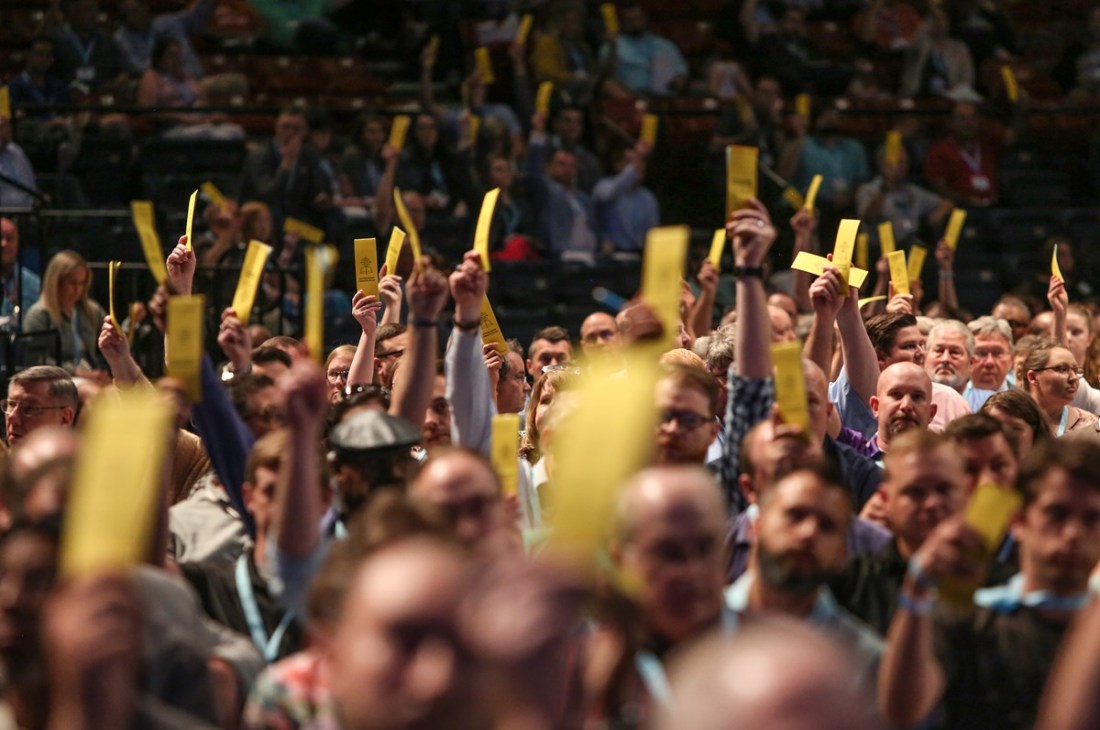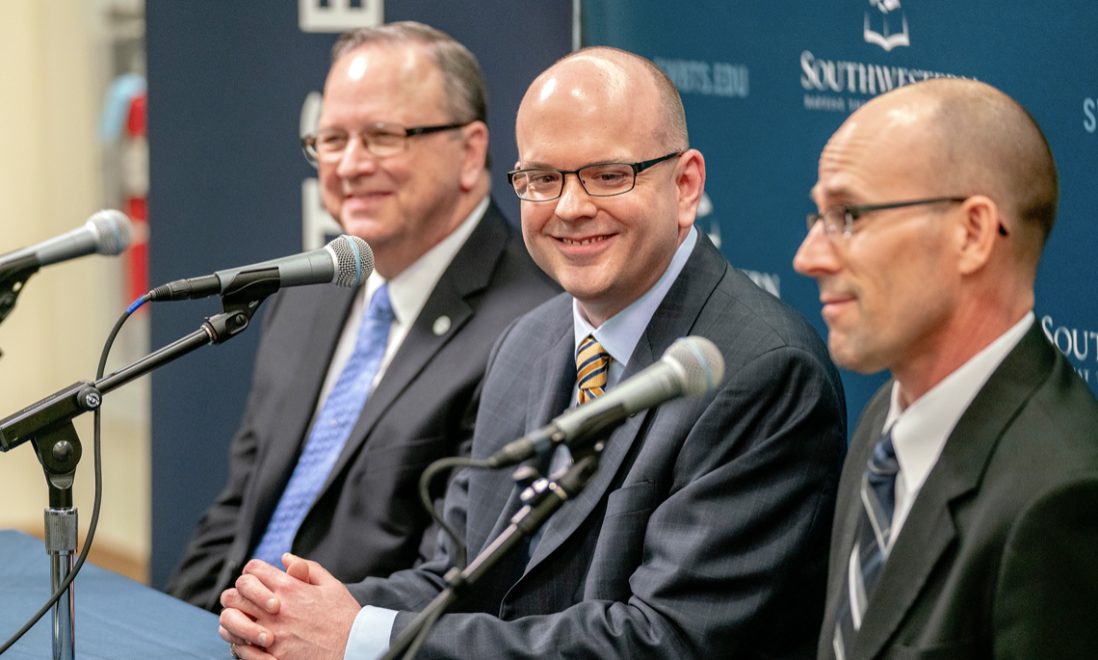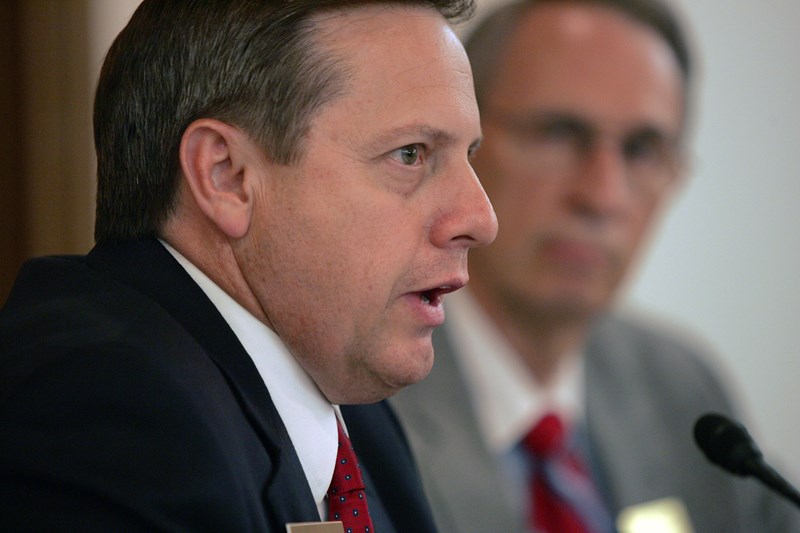
Continued from Part 1.
We arrived in Birmingham on a flight from DFW Airport that was loaded with Baptists heading to the annual convention. A few conversations at the gate and on the airplane centered on the LifeWay store closures, the sex abuse reporting in The Houston Chronicle, and of course, speculation about whether or not the Pattersons would venture to Alabama for the meeting.
Upon landing in Birmingham, we shared a cab with two Texas messengers traveling to the Sheraton and Westin hotels. After checking in and dropping our luggage, we quickly found a security guard at the convention center complex who directed us to a service entrance. For an hour or so, we wandered through the convention arena and exhibit spaces to get a lay of the land, stopping for a few moments to snap a few selfies.
Thus began a week wherein we walked a combined 27.6 miles according to the step counter application on our iPhone 8. What follows is a summary of our thoughts on some of the week’s events, both on stage and back stage, at the Southern Baptist Convention. We will post our elaborations on each of the points below as time permits:
- The President
Last year, during the nomination speeches for SBC President, a Louisiana pastor assessed the kind of man who should lead the convention. The election for president should not be, he said, “about our trying to make a statement to the younger generation.”Neither should the election be “about one candidate’s act of graciousness two years ago.” Southern Baptists needed a leader, Pastor Brad Jurkovich said, “who has the capacity, the wisdom, the experience, and the time it will take.” (emphasis in original)
Well, congratulations Bradley. Southern Baptists got all of that and more, didn’t they?
From the moment the lights in the Dallas convention center went off last year until the fall of the final gavel in Birmingham this month, J.D. Greear has demonstrated tremendous wisdom leading Southern Baptists. There is no telling the time he’s given to the task, and that during one of the more difficult periods of the SBC’s 174 year history.
More than anything, there was a palpable sense in Birmingham that the messengers really like J.D. He pivots from prophet to pastor with natural ease. One moment he’s speaking hard truth to messengers who need to hear it. The next, he’s weeping with abuse survivors and calling us all to do better. He’s pulling together Southern Baptists from every generation, every race, and every theological perspective. He’s providing a context in which we can discuss tough issues like a family.
And he’s got a twinkle in his eye and a smile on his face the whole time. You get the sense he’s loving it . . . but not because he loves the power or popularity. You get the sense that he just loves Southern Baptists, even with all our pettiness and stubbornness and yes, sinfulness. That he wants us — himself included — to love Jesus more.
For a few minutes on Tuesday in the convention exhibit hall, I stood and talked with an older pastor who’s been attending the annual meeting since the early 1970s. He’s led small and large churches in Florida and Texas. He was there in Houston in 1979 and voted for Adrian Rogers. He thinks of himself as one of the guys who helped turn the convention back to biblical fidelity, and he’s proud of what Southern Baptists were able to accomplish.
But the conservative resurgence, he told me, was never just about the Bible. It was about reaching the world for Christ. He told me that his main regret over the years is that the convention never seemed to get back on track with Bold Mission Thrust.
This year, he told me, is the first time he’s felt like Southern Baptists were coming together again around the main thing. He was excited, visibly so. And his enthusiasm is contagious. There I stood talking to this 70-something retired minister holding a tote sack full of convention giveaways and thinking how many more of him are out there, still believing the Bible and waiting for Southern Baptists to get as worked up about reaching the world for Christ as they do Beth Moore speaking in a church on Sunday or intersectionality or some other word nobody seems to know what it means.
Later that evening, I saw that same pastor walking with his wife into the Sheraton Hotel. Their pace was slow but steady. They were holding hands.
For a moment, they looked something to me like Anna and Simeon might have looked to Mary and Joseph in the Temple courts: two aging, faithful servants of of the Lord who’ve been praying for the promised salvation of Israel and waiting to see the light of revelation to the Gentiles.
And I had a sense that maybe, this year, they were joyous that finally — after a long, long wait — Southern Baptists are really putting the Gospel Above All.
For that, we can all thank the Lord for J.D. Greear.
- The Theme.
Convention themes go largely unnoticed, and that’s not necessarily a bad thing. Some are more memorable than others, but most are not very memorable or even clever. Some are memorable only insofar as they are alliterative phrases devoid of any substantial meaning. Take “Love Loud,” for instance. What does that even mean? Then of course, we had the Great Awakening of 2015 followed by Awaken America of 2016.
Presumably we are now fully awake.
In the last 24 hours, we’ve asked five former convention presidents if they remember their own convention themes from the years when they presided over the annual meeting.
Not a single one could remember their convention themes. That’s not an indictment, just a reality. Life goes on, and we forget things.
It’s going to be hard to forget the theme J.D. Greear picked for this year’s convention: “Gospel Above All.” It’s hard to forget because unlike “Love Loud” (shouldn’t it be “Love Loudly,” now that we think about it?), it communicates in three simple words the heartbeat of Southern Baptist churches. It is both descriptive and prescriptive. It’s foundational and aspirational.
J.D. has basically staked out for the convention, “Look, here’s who we are. And this is all that matters.”
I feel sorry for subsequent convention presidents in this respect: How will they contrive a theme that can rival “Gospel Above All” for its profound simplicity? In fact, it may be time for the SBC to adopt “Gospel Above All” as a mission statement for the entire denomination.
In any event, we’re hoping J.D. keeps the theme for the 2020 convention in Orlando.
- Rules of Order and Parliamentarians
This year’s convention was truncated. continuing a trend begun in 1998 when convention messengers approved a bylaw amendment to reduce the convention from its Tues-Weds-Thurs schedule to a reduced two day Tues-Weds schedule. At the time, the Executive Committee study group reported the proposed change would provide “no financial cost savings.” Instead the decision was driven by the reality that messengers were leaving before the Thursday session, resulting in poor attendance and the possibility that a quorum (25 percent of registered messengers) would not be present.
Additionally, the structural changes that reduced the number of entities meant fewer reports. The committee also noted that the convention messengers no longer needed a report from denominational press because that material could be included in the report of the Executive Committee.
Side note: We think the convention should start receiving a report from Baptist Press, and the editor of Baptist Press should be required to answer questions from messengers. Orlando, here we come!
This year, J.D. Greear and Adam Greenway, chairman of the Committee on Order of Business, worked to tighten the convention schedule even more by eliminating evening sessions altogether. The result put the report of the Resolutions Committee late in the date on Wednesday, just before the final gavel.
This was a bad idea, but more about that when we discuss the Resolutions Committee. Needless to say, the tighter convention schedule coupled with the LONG walks it took to get around necessitated careful time management and a brisk gait.
Generally, the convention parliamentarians handled the flow of business commendably, though there were a few times where it seemed that J.D. Greear knew better what was happening on the convention floor than did his parliamentary advisors.
Years ago, we remember sitting in the House Chamber in Washington D.C. during floor debates on various rules that precede votes on legislation. For Washington insiders, it is the rule debate that gets interesting as both the Republican and Democratic leaders on the powerful House Rules Committee hammer out the contours of the debate that will follow on the legislation under consideration.
It was truly our favorite time to be a Congressional staffer. Sitting on the House Floor with a powerful Republican chairman, waiting for the rule debate to conclude so we could proceed to consideration of a bill. Quarterbacking the Republican agenda was the Rules Committee chairman, Rep. David Dreier. For the Democrats, a genteel Kentuckian-turned-New Yorker, the late Rep. Louise Slaughter.
On more than one occasion, we watched while Chairman Dreier dismissed the staff parliamentarians and managed the rule on his own. What followed was a free-wheeling, but always sharp and clever congressional sparring between two astute and ever-polite legislators. We remember sensing the deflated ego of staff parliamentarians who sat down slump-shouldered at the realization that their “services” were not really needed by Chairman Dreier, who was himself a master of parliamentary finesse and decorum.
But Dreier had an innate sense of political optics. He would stand there, alone, tall and crisp, while the Democrats huddled together on the other side of the aisle with teams of staffers trying to keep up with the legendary Rules Chairman. It was a spectacle we shall not soon forget.
Lesson here: the man who knows the rules best usually wins the day.
J.D. Greear and Adam Greenway have both proven themselves to be masterful in this regard. Greear, with his ear and eye attuned to the mood of the messengers and Greenway with his deep respect for procedural accuracy proved a dynamic pair that left the parliamentarians doing what they should do — providing advice when asked, but not tipping the scales through backroom machinations or involving themselves in the debate itself.
Which is why parliamentarians should not use Twitter during the annual meeting, and most certainly not re-Tweet endorsements of matters before the convention offered by entity presidents.
Next year, the Committee on Order of Business would do well to ensure that there is sufficient time to conduct all business, even if that means working with the Resolutions Committee to make sure they don’t try to shoehorn 20,000 words of resolutions on complex matters into 40 minutes of program scheduling.
- The Resolutions Committee
- Wade Burleson’s motion
- Morris Chapman’s motion
- Our motion
- The Seminaries
- The Missionaries
- The Publisher
- The Voices
- The Debate
- The Sermon
- The Question (that wasn’t asked)
- The Credentials Committee
- The Executive Committee
- Our favorite part of the 2019 convention


